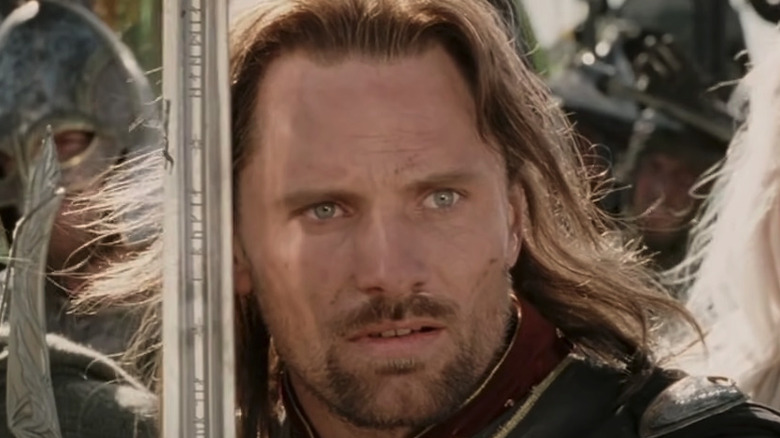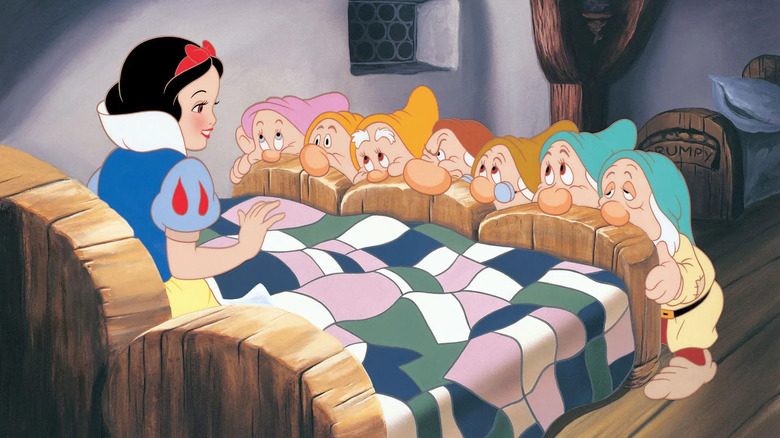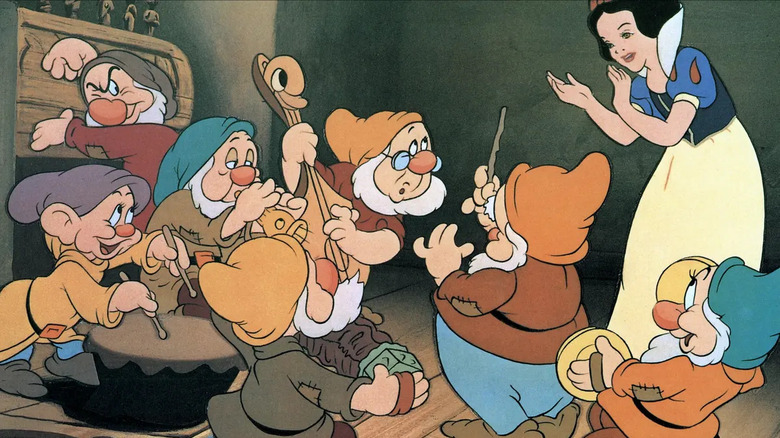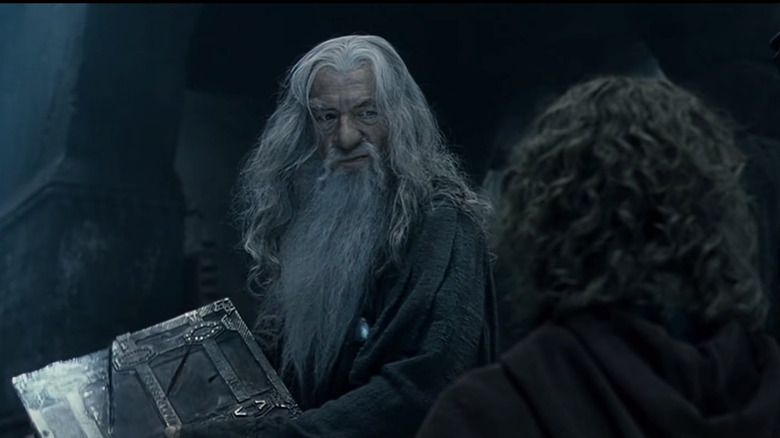The Eye-Popping Fan Theory That Connects Lord Of The Rings To Snow White
Middle-earth is a sprawling world that spans both space and time. Its history stretches back to before time, itself, was even a thing. Its geography spreads out for thousands of miles from north to south and east to west. To top it all off, its creator spent his entire life writing and rewriting the stories of its inhabitants, providing us with an endless stream of variations on how those tales played out and interacted with one another.
All of this narrative fodder has left ample room for fans to have a heyday when it comes to speculation and theorizing. There is no end to the clever headcanon concepts out there. Countless unconfirmed fan theories hypothesize on the "what ifs," postulating anything from Gollum murdering Frodo's parents to Wormtongue being a cannibal.
Most of these theories are just nonsense. They connect a couple of dots, just enough to entertain fair-weather fans of the franchise ... and raise the ire of diehard Tolkienites, to boot. Every once in a while, though, a fan will cogitate long enough to come up with a really good story that, whether genuinely plausible or not, entertains even the strongest of Middle-earth purists out there.
One of those theories has to do with a group of bumbling Dwarves, a magic mirror, and a princess whose epidermis is as white as snow ...
Is Snow White a Lord of the Rings Sequel?
One of the best Middle-earthy fan theories of all time comes to us, in hilariously entertaining form, from Cracked writer Andres Diplotti. The self-proclaimed "mind-blowing" theory postulates that the Disney classic "Snow White and the Seven Dwarfs" is none other than a direct sequel to "Lord of the Rings." Yes, you read that right. The argument boldly suggests that the movie, which happened to come out the same year that "The Hobbit" was published, is kind of a "precursing continuation" of Tolkien's famous epic that would follow. And the best part of this theory is that it doesn't just point to one or two weak threads to connect the two stories. It lays down six different reasons to buy in and believe the hype.
The arguments start by stating that Snow White is a descendant of Aragorn and Arwen. This would also make her an even more distant relative of the ancient Tolkienian heroes Beren and Lúthien. In the case of both couples, it was a "love at first sight" scenario between an Elf and a Man — something echoed in Snow White's own story.
And then there's the prince. Appearing when he's needed, bringing people back from death with a kiss, the guy must be immortal. In fact, the theory posits that he must be one of the Maiar, possibly even Gandalf himself, returning to Middle-earth to check in on the aftermath of the whole War of the Ring scenario.
The writer also builds his case by turning to geography. From epic castles reminiscent of Gondorian architecture to living trees that try to maul the frightened Disney princess, there are numerous parallels between the undisclosed world of Snow White and the well-disclosed regions of Middle-earth that we're familiar with.
Setting up a Sauron rematch?
Next up we have the dwarfs. The question is, are they Tolkien's Dwarves? (Notice the subtle change in spelling.) This theory strongly argues in the affirmative. How? By diving into the meaning of several of the Dwarven names from "The Hobbit." Tolkien pulled many of these from an ancient Viking text called the Poetic Edda. If you translate them, guess what? Dwalin means "sleepy." Oin means "shy." That's right. Disney just went a step further than Tolkien by literally translating the silly Dwarven names right into our native English vernacular. But that's not all.
There are also seven Dwarfs in "Snow White." Does that number ring a bell? If so, that's because it lines up neatly with the seven Dwarven Rings of Power. The theory argues that these seven "dwarfs" are actually the last of the ancient Middle-earth race of "Dwarves," that their lives have been extended by powerful rings, and that they're still lingering around, doing the one thing that they know how to do best: dig for treasure.
The kicker for the whole hypothesis is the return of Sauron. The Dark Lord is destroyed at the end of "The Return of the King" and the Snow White theory claims that Sauron, who technically isn't destroyed by the loss of the Ring and is merely reduced to an incapable spirit, returns in the form of the mirror. Yes, the "Mirror mirror, on the wall" one. Drawing comparisons to the magical power of the Mirror of Galadriel, the author argues that Sauron is simply using this medium to communicate with his new minions as he prepares to return to Middle-earth ... which would also explain Gandalf's sudden and secret reappearance in a princely form.
Was there really a LOTR sequel?
While the theory is fun, most of these connections can't really hold water under scrutiny. Besides, Tolkien didn't even like "Snow White," having some pretty negative feedback after he went and saw it with his buddy "Chronicles of Narnia" author C.S. Lewis (per Atlas Obscura).
Regardless, the concept of a "Lord of the Rings" sequel begs the question, was there ever such a thing? As a matter a fact, yes. At least, Tolkien started working on one, although the scraps of his ideas never go much further than the initial stages. He wrote 13 pages titled "The New Shadow" which started to tell of a story that took place more than two centuries after "The Lord of the Rings." At that point, the long-lived Aragorn was already dead, and his son had been on the throne for a century.
While the idea of a sequel was exciting, though, Tolkien quickly found that a story set in a world dominated by Men wasn't actually all that fun. In a letter to a fan, he pointed out that the LOTR follow-up "proved both sinister and depressing." He went on to add that he could have written a thriller with a dark, menacing plot, but suspense wasn't his genre of choice. In his own words, "I could have written a 'thriller' about the plot and its discovery and overthrow — but it would have been just that. Not worth doing."
Tolkien never got around to a complete sequel. But if anyone out there finishes all 20-plus hours of the existing "Hobbit" and "Lord of the Rings" trilogies and finds they're still itching for more, they can always pop on "Snow White and the Seven Dwarfs" and let their headcanon run wild. Here's to a fun time.



